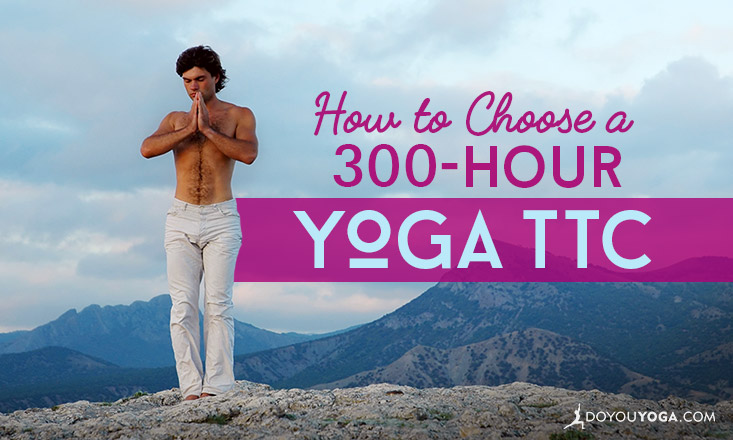The 300-hour Yoga Teacher Training Course is an advanced, second level course for RYT 200 (Yoga Alliance Registered Yoga Teachers with a 200 hour certificate), or students who finished a 200-hour course but are not registered, yet want to keep on studying, practice more, and upgrade their qualifications.
It is very important to choose the right advanced training, because the 300-hour TTC is longer, more expensive, and many times more intensive than the 200-hour. The knowledge given during 300-hour TTC should be an upgrade, so it really matters which school we trust our time to!
How to Choose
The first question which you need to ask yourself is this: WHAT do you want to learn? Doing course after course and collecting certificates which will not apply to your practice or teaching profession is not only a waste of time, money, and energy, but also takes you away from what you want or need to become a better teacher (in Yoga Alliance, so called “Senior Teacher"), or a better yoga practitioner.
If you want to learn more about alignment and adjustments, go for the school which focuses on that. If you are interested in Yoga Therapy – choose therapeutic programs. If you like Ayurveda, make sure that it is in the content of TTC you apply for.
The 300-hour yoga TTC was designed by Yoga Alliance to bring teachers to the next level, allowing them to review and develop their skills and yoga knowledge. Most of the students wait one or two years after their first 200 TTC to recognise which tools they want to develop next, which school/tradition they'd like to grow with, and how they want to grow as teachers and yogis/yoginis.
Here are some important points which help you choose the right school that will let you grow and develop your skills:
1. Art of Teaching / Teaching Methodology
Usually fresh teachers need more confidence on how to prepare a good yoga class, program (block of classes), or yoga retreat. They need a lot of inspiration and support in building the confidence to choose how to sequence the class, how to create a special program if needed, which themes and sequence modifications to explore.
Usually, the knowledge of RYT 200 on sequencing is limited to the style experienced during first TTC, and the tradition or rules which they were taught during their 200 hours basic course. In 300-hour TTC, you get to learn new concepts, sequencing ideas, focus on particular groups of people with specific needs, etc.
A good 300-hour TTC should develop your teaching skills, and should be more focused on the different practical and theoretical aspects of being a better yoga teacher.
2. Anatomy
During the 200-hour TTC, you get 10-20 hours of anatomy and physiology, while the 300-hour TTC gives you the opportunity to really get into the human body and minds! That’s why it is very important to choose who will be your anatomy teacher, and what the program's approach is like.
A 300-hour TTC will teach you the benefits and contraindications of yogic practices: asana, pranayama, mudra, bandhas, and their modifications to suit different groups of students (pregnant women, those recovering from injury, etc.).
3. Teaching Practicum
Everything is easier in theory, but the real opportunity to polish your skills can only happen in practice! If you want to become a better teacher, you need to find the 300-hour program that offers many hours of teaching practicum under the guidance of experienced E-RYT 500 and teaching team.
Only by practicing teaching to other people can you grow as a teacher. You can get the honest feedback, and work on your improvement.
4. Vision of the School and Yogic Values
Your vision of teaching and yoga should match to the vision of the school which you choose. There are many good technical yoga schools which are famous for their knowledge, but may compromise on the way they treat their students.
Overcrowded halls, shouting, ego-based teachers, one-man-show type of course (one person as your teacher), overly expensive rates, and arrogant careless attitude towards the students is what you certainly do not want to experience, ever! If teachers have a good technical knowledge, but no understanding for the yoga teachers' values and yogic qualities, you might end up disappointed and feel 'disconnected.'
It is important to choose who you want to learn from. Remember, yoga is far more than gymnastic exercises on the mat! If your teacher makes you feel guilty, scared, or humiliated instead of inspired — that’s not the learning opportunity, that’s the compromise!
Qualities and values which a teacher represents are important factors for a successful training and upgrading your skills. If we want to learn, we want to feel comfortable with receiving, and that can happen only when we find a good leader to learn from!
Once you find the program which suits you, and the people who support your vision of teaching yoga, the most essential part of the job is done! Now here's part 2, where I discuss the important points about the logistical aspects of choosing the right 300-hour yoga TTC for you, especially if you're traveling abroad for it.


